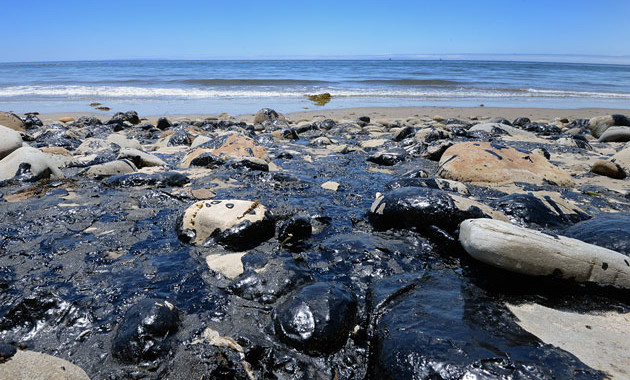By: Arlo Bender-Simon
As someone who spends a lot of my time paying attention to fossil fuel resistance efforts, I am growing numb to the term “disaster.” I am reading pretty much every other week about a spill, an explosion, homes evacuated, waterways polluted…..makes me want to tune out. If someone asks me the question: When will these disasters end? I am tempted to answer, they won’t.
What I am doing is looking at the big picture.
When a disaster happens in a specific location, the local population notices and it is easy to get them fired up, ready to change the system that allowed this to happen. But 99.99% of the world’s population will always be NOT local to whatever recent catastrophe is in the news. For us, these local disasters will pretty much always be a small, distant part of the big picture that is the global energy system (or any piece within social and environmental injustice).
Following the oil spill near Refugio Beach on May 19, many Californians are choosing to direct their righteous anger into heightened cries for a ban on offshore fracking, as well as a moratorium on other forms of well stimulation and enhanced oil recovery. While those of us here in Santa Barbara (now folks in Oxnard and South Santa Monica Bay as well) must deal with this icky, gooey, toxic mess; our friends and family throughout California, and the United States, seek to use this disaster as an example of why more protections are needed and why we need to stop the full steam ahead drilling madness.
To me, what is most frustrating about this spill is how normal it is. Sure, it is a shock for Santa Barbara and it sure as hell ain’t normal for the Gaviota Coastline. But for the Fossil Fuel Industry, this is everyday business.
Did you read about the oil spill into the Yosemite River earlier this year? How about the five oil train explosions in North America so far in 2015? The oil storage facility that caught fire in Piru a few weeks ago? The refinery explosion in Torrance? Know that the same pipeline operator, Plains All-American, spilled oil into the streets of Atwater Village in Los Angeles last year? Oh yea, and the average number of pipeline “incidents” in this county over the past 30 years sits around 300 per year. (America’s Dangerous Pipelines, Center For Biological Diversity http://www.biologicaldiversity.org/campaigns/americas_dangerous_pipelines/)
I have problems with the Western States Petroleum Association WSPA, and really anyone who makes excuses and bends the truth on behalf of the fossil fuel industry. They want to make sure the local disaster and the big picture always remain disconnected. They want us to remain confused, and doubtful of the folks who confront the industry or call for stronger regulation. They want to make sure that the anger we are feeling is not put into meaningful action.
“There is absolutely no link between hydraulic fracturing and this week’s release of oil at Refugio Beach,” (http://www.reuters.com/article/2015/05/22/us-california-oilspill-environmentalists-idUSKBN0O700L20150522)
These are the words of Tupper Hull, spokesman for WSPA. He is dead wrong.
Regardless of what oil was inside of the pipeline, this is a problem of fossil fuel industry infrastructure. Infrastructure that has been in place for decades, and that is not getting any younger.
Fracking is just one form of extreme extraction techniques that are increasingly being put into use. Acidization is another. So is Cyclic Steam Injection, Gravel-Packing, Steam-flood Injection, water-flood injection……there are more.
All of these techniques seek to extend the life of existing oil fields, and therefore extend the use of the infrastructure that supports them. Pipelines are the safest method of transporting oil, and all pipelines leak….it is only a matter of time.
We need to be investing all of our creative thinking and our collective future into a renewable energy infrastructure to replace the existing fossil fueled system. Until we do, we increase the risk that in our children’s future, oil spills will remain a regular happening throughout the world.
We know that our communities, our shorelines, our relatives, our endangered species, our rivers, and more are at risk every day. But we know that’s not all that is at risk. Disasters such as this one put future profits of the oil industry in the spotlight, make us question the morality of such massive wealth accumulation in the face of such widespread destruction.
Until oil companies consider their profits less important than their moral responsibility to prevent spills from EVER happening, this will continue.
Photo Credit: Mike Eliason / Santa Barbara County Fire Department photo of the Refugio Spill

